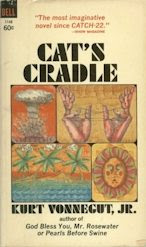 Completing our tribute to the late Kurt Vonnegut, the Book of the Week is More Than Human by science fiction great Theodore Sturgeon. Kurt Vonnegut publicly stated that Theodore Sturgeon was the inspiration for his fictional sci-fi author Kilgore Trout -- although really, aside from having the name of a fish, Kilgore Trout bears far less resemblance to Sturgeon than to Vonnegut himself.
Completing our tribute to the late Kurt Vonnegut, the Book of the Week is More Than Human by science fiction great Theodore Sturgeon. Kurt Vonnegut publicly stated that Theodore Sturgeon was the inspiration for his fictional sci-fi author Kilgore Trout -- although really, aside from having the name of a fish, Kilgore Trout bears far less resemblance to Sturgeon than to Vonnegut himself.This is the first paperback printing of More Than Human, published in 1953, simultaneously with the extremely rare hardcover first edition. The cover is by famed SF artist Richard Powers. Theodore Sturgeon was one of the leading SF authors from the 1940's through the 70's, although for whatever reason he never caught the attention of the general public as Kurt Vonnegut did. In addition to his fiction, Sturgeon is widely remembered in the genre for announcing the principle that came to be known as Sturgeon's Law: "90% of all science fiction is crap. But then, 90% of everything is crap."
More Than Human, about a small group of misfits who prove to represent the next step in human evolution, is widely regarded as Sturgeon's best novel. Next week's Book of the Week will be my personal favorite Sturgeon novel.



